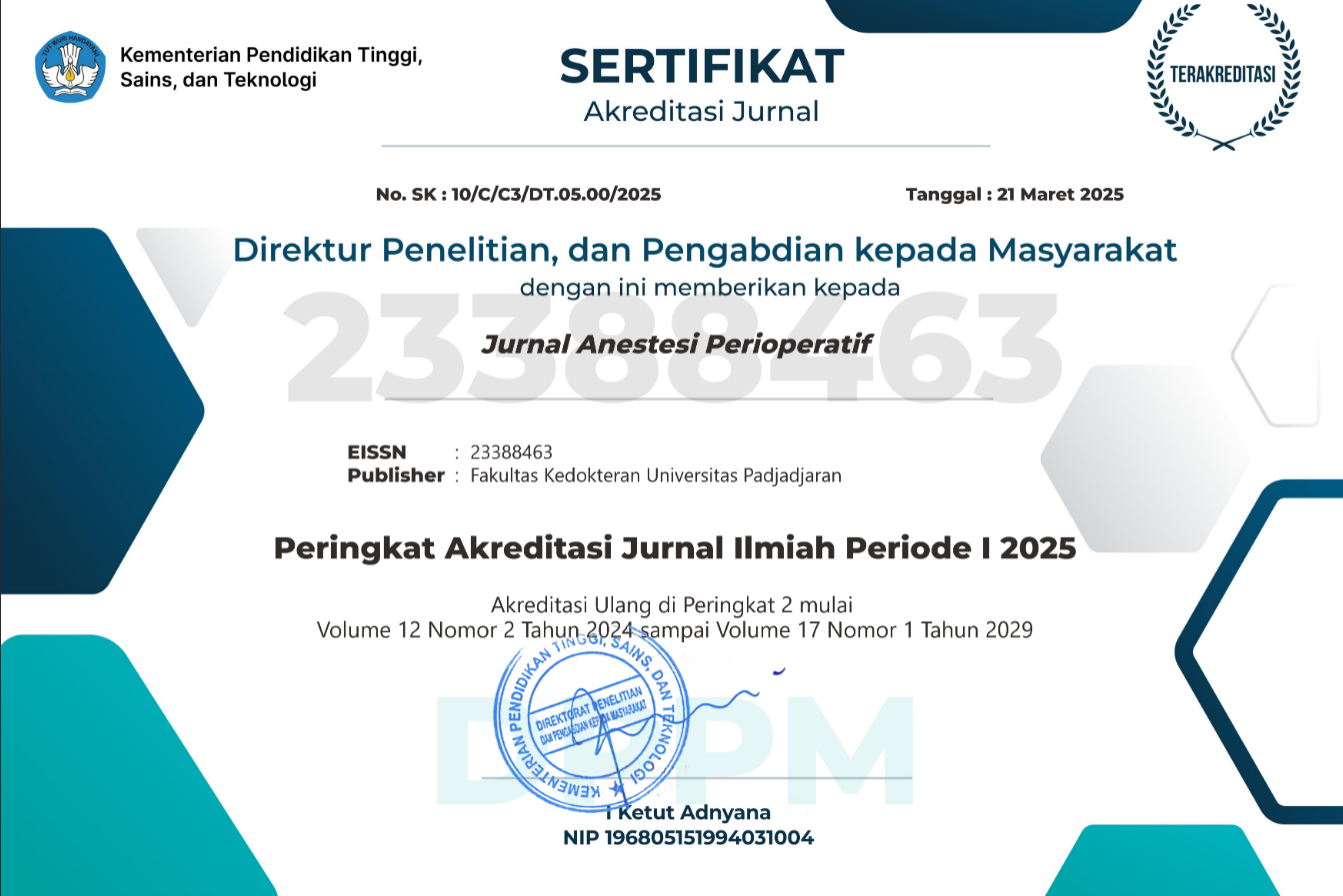Perbandingan Obat Kumur Benzydamine Hydrochloride 22,5 mg dan Ketamin 40 mg dalam Mengurangi Nyeri Tenggorok dan Suara Serak Akibat Intubasi Endotrakeal
Abstract
Nyeri tenggorok dan suara serak merupakan komplikasi yang sering muncul pada anestesi umum dengan intubasi endotrakeal yang memengaruhi kenyamanan dan kepuasan pasien setelah operasi. Penelitian ini bertujuan mengetahui efektivitas obat kumur benzydamine hydrochloride dan ketamin dalam mengurangi nyeri tenggorok dan suara serak setelah anestesi umum dengan intubasi endotrakeal. Terdapat 58 pasien berusia 16–60 tahun yang akan menjalani anestesi umum di Instalasi Bedah Sentral RSUP H. Adam Malik Medan pada bulan Oktober–November 2013 dengan intubasi endotrakeal secara acak tersamar ganda dan dibagi dalam 2 kelompok yang sama besar. Sepuluh menit sebelum masuk kamar operasi, pasien menerima obat kumur ketamin atau benzydamine hydrochloride sebanyak 15 mL untuk dikumur selama 60 detik. Setelah operasi pasien diberikan ketorolak. Penilaian nyeri tenggorok dan suara serak dilakukan pada 1, 6, 12, dan 24 jam setelah selesai operasi. Hasil penelitian 6 pasien dikeluarkan dari penelitian. Insiden nyeri tenggorok pada jam I pada kelompok ketamin 14 dari 26 dan benzydamine hydrochloride 18 dari 26, sedangkan insidens suara serak pada jam I pada kelompok ketamin 16 dari 26 dan benzydamine hydrochloride 18 dari 26. Secara umum benzydamine hydrochloride lebih baik dibanding dengan ketamin, namun dengan uji chi-kuadrat tidak berbeda antara kedua kelompok obat.
Comparison of Benzydamine Hydrochloride 22.5 mg and Ketamine 40 mg Mouthwash Reduce Sore throat and Hoarseness after Endotracheal Intubation
Sore throat and hoarseness is a frequent complication in general anesthesia with endotracheal intubation, which affects the comfort and satisfaction of patients after surgery. This study aimed to determine the effectiveness of ketamine and benzydamine hydrochloride mouthwash in reducing sore throat and hoarseness following general anesthesia with endotracheal intubation. Fifty eight patients aged 16–60 years undergoing general anesthesia at the Central Operating Theater of H. Adam Malik General Hospital Medan with endotracheal intubation during October–November 2013 were double-blind randomized and divided equally into 2 groups. Ten minutes before entering the operating room, patients received ketamine or benzydamine hydrochloride mouthwash as much as 15 mL for a 60 seconds gargle. After surgery, patients were given ketorolac. Assessment on sore throat and hoarseness was performed at 1, 6, 12, 24 after the completion of surgery. Six patients were excluded from the study. The incidence of sore throat in the first hour in ketamine group was 14 of 26 and 18 of 26 in hydrochloride benzydamine group. Meanwhile, the incidence of hoarseness in the first hour for both groups were 16 of 26 and 18 of 26, respectively. In general, benzydamine hydrochloride is better than ketamine although the difference is not statistically significant.
Keywords
Full Text:
PDFDOI: https://doi.org/10.15851/jap.v5n1.997
Article Metrics
Abstract view : 2362 timesPDF - 2179 times
This Journal indexed by

JAP is licensed under a Creative Commons Attribution-NonCommercial 4.0 International License
View My Stats



